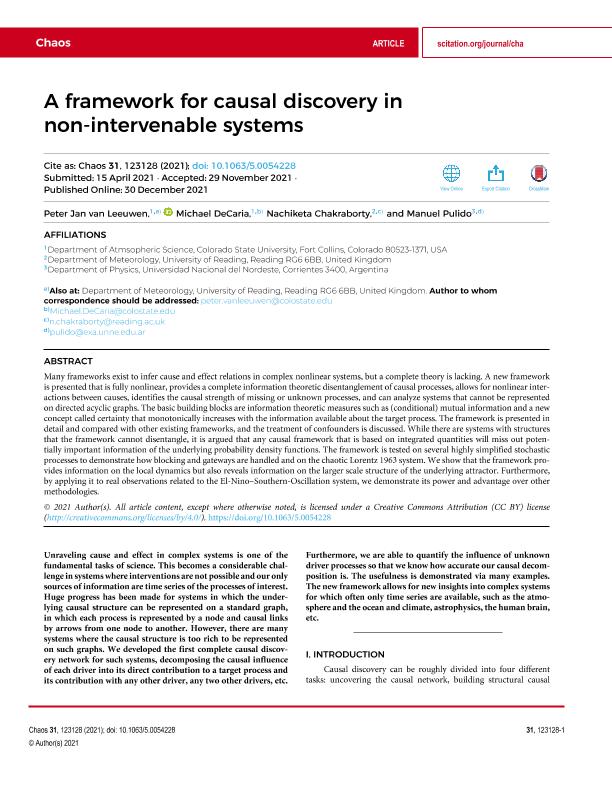Mostrar el registro sencillo del ítem
dc.contributor.author
Leeuwen, Peter Jan van

dc.contributor.author
DeCaria, Michael
dc.contributor.author
Chakraborty, Nachiketa
dc.contributor.author
Pulido, Manuel Arturo

dc.date.available
2022-06-06T10:22:41Z
dc.date.issued
2021-12
dc.identifier.citation
Leeuwen, Peter Jan van; DeCaria, Michael; Chakraborty, Nachiketa; Pulido, Manuel Arturo; A framework for causal discovery in non-intervenable systems; American Institute of Physics; Chaos; 31; 12; 12-2021; 1-19
dc.identifier.issn
1054-1500
dc.identifier.uri
http://hdl.handle.net/11336/158972
dc.description.abstract
Many frameworks exist to infer cause and effect relations in complex nonlinear systems, but a complete theory is lacking. A new framework is presented that is fully nonlinear, provides a complete information theoretic disentanglement of causal processes, allows for nonlinear interactions between causes, identifies the causal strength of missing or unknown processes, and can analyze systems that cannot be represented on directed acyclic graphs. The basic building blocks are information theoretic measures such as (conditional) mutual information and a new concept called certainty that monotonically increases with the information available about the target process. The framework is presented in detail and compared with other existing frameworks, and the treatment of confounders is discussed. While there are systems with structures that the framework cannot disentangle, it is argued that any causal framework that is based on integrated quantities will miss out potentially important information of the underlying probability density functions. The framework is tested on several highly simplified stochastic processes to demonstrate how blocking and gateways are handled and on the chaotic Lorentz 1963 system. We show that the framework provides information on the local dynamics but also reveals information on the larger scale structure of the underlying attractor. Furthermore, by applying it to real observations related to the El-Nino-Southern-Oscillation system, we demonstrate its power and advantage over other methodologies.
dc.format
application/pdf
dc.language.iso
eng
dc.publisher
American Institute of Physics

dc.rights
info:eu-repo/semantics/openAccess
dc.rights.uri
https://creativecommons.org/licenses/by-nc-sa/2.5/ar/
dc.subject
SHANNON
dc.subject
TIME SERIES
dc.subject
MULTIVARIATE CAUSALITY
dc.subject.classification
Otras Ciencias de la Computación e Información

dc.subject.classification
Ciencias de la Computación e Información

dc.subject.classification
CIENCIAS NATURALES Y EXACTAS

dc.title
A framework for causal discovery in non-intervenable systems
dc.type
info:eu-repo/semantics/article
dc.type
info:ar-repo/semantics/artículo
dc.type
info:eu-repo/semantics/publishedVersion
dc.date.updated
2022-05-06T16:44:34Z
dc.identifier.eissn
1089-7682
dc.journal.volume
31
dc.journal.number
12
dc.journal.pagination
1-19
dc.journal.pais
Estados Unidos

dc.journal.ciudad
New York
dc.description.fil
Fil: Leeuwen, Peter Jan van. State University of Colorado - Fort Collins; Estados Unidos
dc.description.fil
Fil: DeCaria, Michael. State University of Colorado - Fort Collins; Estados Unidos
dc.description.fil
Fil: Chakraborty, Nachiketa. University of Reading; Reino Unido
dc.description.fil
Fil: Pulido, Manuel Arturo. Consejo Nacional de Investigaciones Científicas y Técnicas. Centro Científico Tecnológico Conicet - Nordeste. Instituto de Modelado e Innovación Tecnológica. Universidad Nacional del Nordeste. Facultad de Ciencias Exactas Naturales y Agrimensura. Instituto de Modelado e Innovación Tecnológica; Argentina
dc.journal.title
Chaos

dc.relation.alternativeid
info:eu-repo/semantics/altIdentifier/doi/http://dx.doi.org/10.1063/5.0054228
dc.relation.alternativeid
info:eu-repo/semantics/altIdentifier/url/https://aip.scitation.org/doi/10.1063/5.0054228
Archivos asociados
